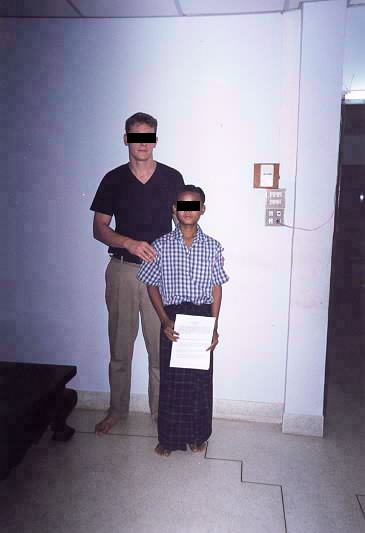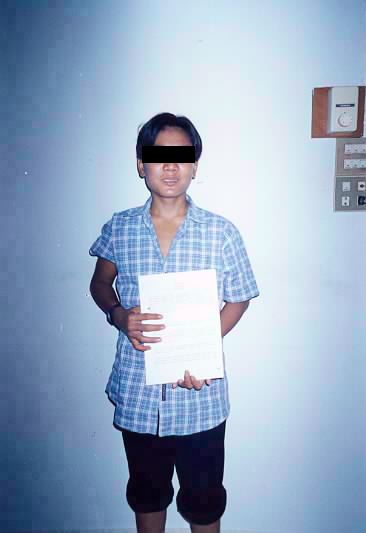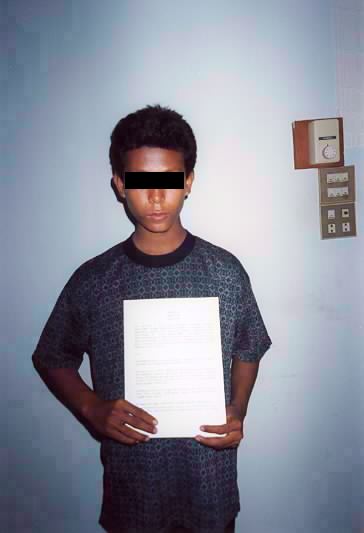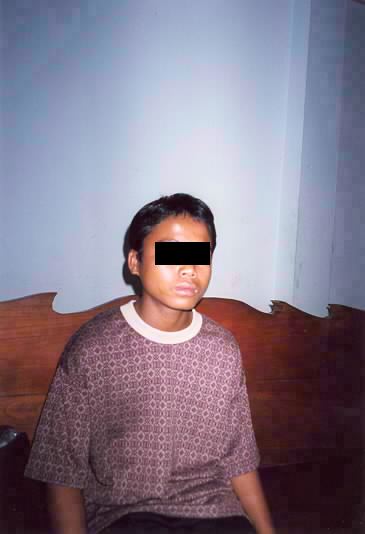TINY
FISTS: INTERVIEWS WITH FOUR FORCIBLY CONSCRIPTED BOY SOLDIERS OF THE BURMESE
ARMY
By Saw Takkaw
August 2003
“Burma’s army
preys on children, using threats, intimidation and often violence to force
young boys to become soldiers. To be a boy in Burma today means facing the
constant risk of being picked off the street, forced to commit atrocities
against villagers, and never seeing your family again.”
- Jo Becker, Human Rights Watch
The nation of Burma is a human disaster zone. Future historians, no doubt,
will place the Burmese military dictatorship (SPDC) on the same despicable
page as the Khmer Rouge and the regimes of Ceausescu and Amin. Reflecting
upon the horror that constitutes today’s Burma, future generations, scholars,
and those who agonized under SPDC rule will most certainly utter the timeless
and fatigued question, “Why?”
But presently, we in the field of human rights documentation watch with growing
consternation as the mountainous stacks of reports on human rights violations
from Burma grow shamefully higher. These piles of reports, photographs, and
interviews that were meant to wake up the world to the situation in Burma
and act as a voice for its victims have instead formed makeshift, impromptu
memorials to a nation that has suffered over forty years of brutal military
rule. The four lives discussed in this report add yet another thin layer to
that now massive heap.
In the last fifteen years, the SPDC has doubled the size of its army, making
it among the largest in Southeast Asia. In its desperate struggle to maintain
power, the ruling generals of Burma are attempting to mold the peoples of
Burma into a solid fist - a fist not to defend against outside attack or invasion,
but to achieve total domination of the peoples of which the fist is composed.
The SPDC’s intense drive toward militarization has left thousands dead
and maimed, hundreds of thousands internally displaced or in refugee camps,
and millions living in poverty and fear. The four boys discussed in this report
are among the human wreckage, the “trampled grass” of this institutionalized
barbarity.
I would like to also comment on the treatment the subjects received from those
they surrendered to, the KNU (Karen National Union). For the most recently
surrendered youths, I was contacted by a KNU battalion commander, who asked
if I would approach the relevant humanitarian agencies on their behalf. On
several occasions I also observed the boys while they were with the KNU. I
found them to be decently fed, clothed, and treated. They were not held under
confinement. Judging by the fact that I had just previously visited a Karen
IDP (internally displaced persons) site, where numerous Karen children were
suffering from malnutrition, I must doubly salute the KNU’s care of the
subjects of this report.
Lastly, this study is a salute to its young subjects, four boys, who at great
risk threw down the gun that had been forced into their hands. It is now the
responsibility of the international community to provide aid that will fill
their empty hands and to take an active role in rebuilding their shattered
lives.
In order to avoid repetition, consistencies in the subjects’ reports
that do not provide additional information into the nature of each specific
case are listed below. The reader should also note that the subjects were
interviewed individually.
1. All of the subjects were forcibly conscripted. It is important to note
that the subjects of this report were not drafted, but were arbitrarily arrested
and pressed into military service.
2. Although none of the subjects ever engaged in combat, they all received
combat arms training and were issued and carried weapons in the field.
3. The subjects received little if any political indoctrination while in training
or on active duty. The subjects were conditioned, however, to obey military
authority unconditionally.
4. The subjects were told by their training officers that if they were captured
by “the insurgents,” they would be tortured and killed.
5. The subjects were in combat arms training for approximately four and a
half months (although some were interned in holding centers while waiting
for the class size to reach an acceptable number to commence training).
6. All of the subjects were sent to frontline units in Karen state.
7. All subjects held the rank of rifleman (lowest enlisted rank) or the equivalent
thereof in the Burmese Army.
8. All of the subjects fled from their units and surrendered to the Karen
National Union.
9. All of the subjects, save one, served in the Burmese army for less than
one year.
10. All of the subjects asserted that they had great difficulty carrying their
prescribed loads (e.g., rifle, web gear, backpack, ammunition, and mortar
rounds), and that they found the equipment to be oversized and unwieldy.
11. All of the subjects asserted that they had not been fed adequately while
in training or on active duty.
12. All the subjects stated that they had no contact with their families while
in training, but were permitted to see their families briefly after the graduation
ceremony.
*All subjects were presented by this writer with a copy of the UN Universal
Declaration of Human Rights (in Burmese).
1. “I am my parent's only son.”
Maung Y
Age: 14
Ethnicity: Burman
Maung Y standing next to the author. The boy’s small stature clearly
demonstrates his physical unsuitability for military service.
Maung Y was returning home after attending an evening tutorial class when
police in uniform and in civilian clothes seized him. They informed him that
he was being arrested for “loitering in the dark.” Maung Y was then
taken to a military camp for combat arms training, where he estimated that
over half of the recruits that he saw were under the age of 16. His class
was composed not only of ethnic Burmans, but also Shan, Karen, Mon, and Tavoyan
peoples. Nothing less than total and unquestioning obedience was demanded
of the recruits. This sterling rule was reinforced with beatings, which Maung
Y claimed he received often. The diet in training consisted of rice with small
portions of beans, eggs, or watery beef soup. The eggs served to the recruits
were sometimes rancid causing many to have dysentery. He also stated that
some of the young recruits became ill and subsequently went blind. (It is
unclear why. Perhaps it was due to protein deficiency or the intake of certain
medicines.) Maung Y claimed it was possible for parents to buy back their
children from the army, provided it was before graduation. Unfortunately,
Maung Y’s parents are poor, and he believed that they had no idea of
his whereabouts until shortly before his graduation from training. At the
graduation ceremony he saw his father who was very sad but could do nothing
about his son’s situation.
Maung Y was then sent to the Karen front. Weighing only ninety pounds, he
had to shoulder forty pounds of military equipment, including a rifle, web
gear, and ammunition. Marching in the steep hills of Karen state, he was expected
to keep pace with the adult troops despite his age and small body size. On
one occasion, Maung Y and his fellow soldiers were given a drink of special
army rum just before a strenuous march. He claimed that after drinking special
army rum, which differs from the army rum often issued to Burmese troops,
he and the other soldiers “had energy and were resistant to all pain.”
He also heard that special army rum was administered to troops just before
assaults on enemy positions.
Maung Y spent only one month on active duty before he escaped. During that
time, he saw prisoner porters, who were carrying heavy loads in the mountains
for the army, beaten by troops. His NCO’s (noncommissioned officers)
gave him extra duties, humiliated him with insults, and slapped him constantly.
Shortly before his escape, he was slapped and beaten by an NCO for cooking
more than the allotted rice ration for his boy soldier comrades. “We
were never given enough food,” he stated.
2. “I think what happened to me was unjust.”
Maung K
Age: 15 (conscripted at age 12)
Ethnicity: Burman
Maung K holding a copy of the UN Universal Declaration of Human Rights (in
Burmese language).
Maung K was waiting at a bus stop (during daylight hours), when he was seized
by soldiers. The soldiers told him he could either join the army or go to
jail. He was interned in a holding camp for four months because there were
not enough recruits to start training. In training, beatings were frequent
and the recruits were told that anyone who opposes the government is a thaung
jan thu (terrorist).
After training, he was sent to a front line unit in Karen state. He figures
there were about thirty underage soldiers in his battalion (numbering two
hundred men).
At age 12, he was issued one bottle of army rum a week. Maung K found it extremely
difficult to bear the weight of the military equipment that was issued to
him. In the field, he saw prisoner porters, who carry food and other provisions
for the army, being beaten by soldiers. He discovered as well that the NCOs
of his battalion were seizing food from local villagers. On a few occasions,
he heard rumors around the camp about Burmese troops raping women and burning
villages during anti-insurgency campaigns in ethnic minority areas. Once he
was late for patrol and in his haste also forgot his rifle. For this offense,
his NCO beat him severely. “I just could not take it any more. I was
unhappy and homesick,” claimed Maung K. After three years in the army,
he decided to escape. He slipped away from his front line post and walked
to a Karen village about three hours away. “I turned myself over to the
villagers, and I waited there for the KNLA soldiers,” stated Maung K.
KNLA soldiers were surprised at the boy’s emaciated condition. Months
after his escape from the Burmese Army, a senior KNU official informed me:
“We never treated him as a prisoner, and he is not in captivity here.
Look at him. He has grown a lot since he has been here. When he first came
to us, he was really skinny.”
3. “I saw my father after the graduation ceremony (the first contact
he had with his family since his seizure by the army). He was sad and said,
“Lead a good life, son.”
Maung N
Age: 16
Ethnicity: Burman
Maung N holding UN Universal Declaration of Human Rights (in Burmese language).
Muang N was seized at night with two of his friends as they were returning
from an evening tutorial class. He recounts his seizure:
“They (the soldiers) surrounded us and told us not to run. We were then
forced into a truck. I was scared. I did not know what was going to happen
to me.”
Maung N was immediately sent to a military training camp. He stated the majority
of training consisted of weapons maintenance, drill, and marching, with little
emphasis put on tactical, combat, or survival training. He speculated that
most of the recruits in his one thousand man training battalion were under
18 and primarily ethnic Burman. He often saw instructors strike recruits with
hands or sticks for making “small mistakes.” Maung N stated, “We
(boy soldiers) were very afraid. You could be beaten for the slightest mistake.”
Recruits that attempted to escape were subject to violent and prolonged beatings.
Maung N heard rumors that one the members of his recruit class died from injuries
after sustaining one of these beatings. After forced conscription, the first
contact Maung N had with his family was at his graduation ceremony from the
army. “We (the recruits) wrote letters in training and the instructors
collected them. But I do not think they were ever posted,” said Maung
N.
Upon arrival to his front line post, Maung N witnessed prisoner porters being
beaten, and was ordered to shoot them if they attempted to escape. He estimated
that thirty of the soldiers in his one hundred and fifty man battalion were
underage. Homesick and scared, he claimed that there was no one in the battalion
that he could talk to or rely on. Instead, he was expected to perform whatever
tasks were assigned to him and endure the hardships of his new life. Hunger,
exhausting labor, and mistreatment by his NCOs compelled Maung N to flee:
“I had to carry heavy bags of rice uphill. We worked all day long, and
it was only at night that we were given our rifles. I knew soon we were going
to build a new camp, and that meant building many fences. I could not take
it anymore.”
4. “I am a Buddhist. I do not want to kill.”
Maung A
Age: 15 (forcibly conscripted at age 14)
Ethnicity: Burman
Another fractured life: Maung A
Maung A was seized on the streets of his hometown by a Burmese Army sergeant
in uniform. That same day he was whisked away to a recruiting center, handed
a uniform, and was told by an instructor, “Now, you are a soldier. If
you try to run away, you will be shot.” During training, he heard rumors
that recruiters were being paid 5000 Kyat per new recruit they could “enlist.”
Maung A speculates that at least half of the members of his recruit company
were boys under the age of 16. He witnessed recruits being struck or beaten
by instructors for “making mistakes,” for example, during marches
or close order drill. Instructors told his recruit company that “rebel
groups” routinely committed rapes and murders, and would cut the throat
of any Burmese soldier taken prisoner. Maung A claims that recruits were not
fed adequately or given satisfactory medical care, “I was always hungry.”
He also heard rumors that three members of his recruit class died of tuberculosis
in the camp medical clinic.
At the front line in Karen state, he observed prisoner porters being beaten
by the Army. Although he was told by his NCOs that the porters were convicts,
he believes some of them were villagers. Under the weight of heavy, oversized
military equipment, Maung A performed each day ten hours of labor and assorted
military activities, in addition to night sentry duty. He was aware of the
difficulties faced by other boy soldiers in his front line battalion and stated,
“They were homesick and crying.” Maung A decided to flee from his
post and surrender to the Karen National Union due to a combination of emotional
and physical exhaustion, “I was overloaded. I was tired of the beatings
and the hard work.”
Plans for the Future
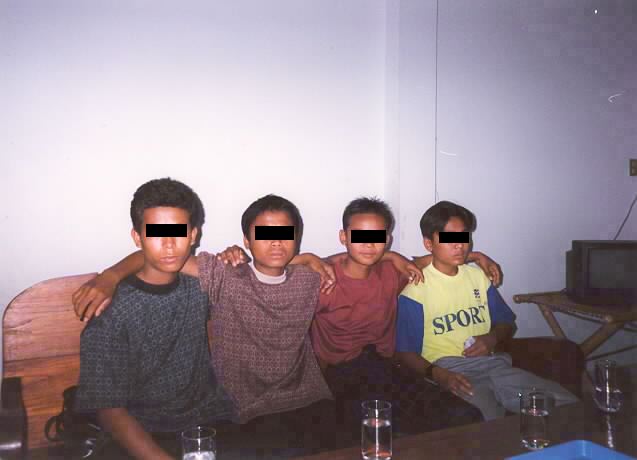
Maung Y: “I want to go home. I want to catch up on all the schooling
that I missed.”
Maung K: “I want to train to be a boxer.”
Maung N: “I want to go home. I also want to get job there, but I am afraid
I will never be able to return to my home village.”
Maung A: No plans.
Parties interested in providing relief for the subjects of this report should
contact: kawthule@yahoo.com
Closing note: The Thai agreement with the SPDC to return escaped child soldiers,
in the words of one border human rights worker, seals the fate of over 70,000
child soldiers, the vast majority of whom were press ganged into the Burmese
Army. This constitutes a formal commitment by the Thais to abuse human rights.
